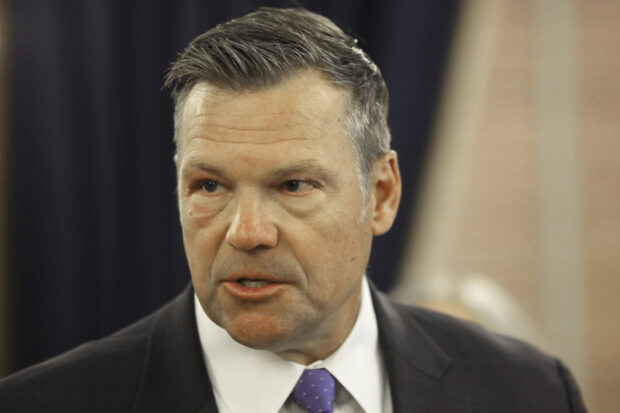Kansas attorney general sues to prevent transgender people from changing driver’s licenses

Kansas Attorney General Kris Kobach answers questions during a news conference about a new state law that defines male and female in state law so that transgender people can’t change their driver’s licenses and birth certificates to reflect their gender identities, Monday, June 26, 2023, at the Statehouse in Topeka, Kansas. The number of people making those changes jumped more than 300% this year ahead of the new law taking effect. (AP Photo/John Hanna)
TOPEKA, Kansas — The Republican attorney general of Kansas sued Friday to force the state to be among a few that prohibit transgender people from changing their sex on their driver’s licenses and to repudiate the Democratic governor, who continues to allow such changes despite a new anti-trans law.
Attorney General Kris Kobach filed his lawsuit in state court, seeking an order to stop Gov. Laura Kelly, and agencies under her control, from letting transgender people change their licenses. Kobach contends a law that took effect Saturday prevents such changes and requires the state to reverse any previous changes in its records.
Kobach has argued that the law applies in the same way to birth certificates, but the lawsuit filed Friday doesn’t address those documents. The settlement of a 2018 federal lawsuit requires Kansas to allow transgender people to change their birth certificates.
“The Governor cannot pick and choose which laws she will enforce and which laws she will ignore,” reads the lawsuit, filed in state district court in Shawnee County, home to the state capital, Topeka. It seeks to force the governor to enforce the law as he sees it and names as defendants two officials who oversee driver’s licenses.
READ: US Supreme Court deals blow to LGBT rights in web designer case
Article continues after this advertisementWhile Kelly isn’t named as a defendant, the lawsuit holds her responsible for the policy on driver’s licenses.
Article continues after this advertisement“Governor Kelly is faithfully executing the laws of the state and has directed her administration to as well,” spokesperson Brianna Johnson said in a statement.
Even with a raft of measures targeting transgender people in statehouses across the US this year, Kansas would be atypical for not allowing them to change sex or gender markers on birth certificates, driver’s licenses or either. Montana and Tennessee also have policies against changing either document, and Oklahoma has a policy against changing birth certificates.
“The state has been doing just fine,” said Adam Kellogg, a 20-year-old transgender University of Kansas student. “The fact that this is an issue now for some reason is confusing, to say the least, when there hasn’t really been a problem.”
READ: Man, woman or…X: US rolls out gender-neutral passports
The dispute between Kobach and Kelly highlights an odd feature of their generally conservative state’s modern politics. In the past 50 years, Republicans have won every US Senate race, but Democrats have won half of the governor’s races with support from GOP moderates. The Legislature has anti-abortion Republican supermajorities, but a statewide vote in August 2022 decisively affirmed abortion rights.
Kelly won her first term as governor in 2018 by defeating Kobach, who was then the Kansas secretary of state. He staged a political comeback last year by winning the attorney general’s race as she captured a second term, both of them by slim margins.
More than 900 people in Kansas have changed the listing for sex on their birth certificates in the past four years. About 400 have changed their driver’s licenses in that period, about four times as many a month this year as previously. The number of driver’s licenses changes accelerated in May and June as LGBTQ+ rights advocates encouraged people to do it ahead of the new law.
READ: LGBTQ+ priority lane in LTO prompts Poe to renew call for inclusive gov’t service
That new law defines a person’s sex as male or female, based on the “biological reproductive system” identified at birth, applying that definition to any state law or regulation. It also says that “important governmental objectives” of protecting people’s privacy, health and safety justify single-sex spaces such as bathrooms and locker rooms.
The governor’s office said last week that the state health department, which handles birth certificates, and the motor vehicle division, which issues driver’s licenses, would continue allowing transgender people to change the markers for sex on those documents. Her office said lawyers in her administration had concluded that doing so doesn’t violate the new law. Kelly is a strong supporter of LGBTQ+ rights and vetoed the measure, but the Legislature overrode her.
READ: Group seeks PhilHealth package for transgenders
But the governor’s statements about the new law are at odds with descriptions from LGBTQ+ rights advocates before the Republican-controlled Legislature enacted it over Kelly’s veto. The advocates predicted that it would prevent transgender people from changing their driver’s licenses and amounted to a legal “erasure” of their identities, something Kobach confirmed as the intent when he issued his legal opinion.
Kansas is also among at least 10 states with a law against transgender people using facilities in line with their gender identities, though it includes no enforcement mechanism.
“For me to go into a bathroom and not have a marker that represents who I am, I was terrified. I was afraid I was going to get accosted or harassed,” said Ty Goeke, a 37-year-old transgender Topeka resident who changed both his birth certificate and driver’s license last month. “Now that I have the correct marker, I feel much better, feel more confident.”
READ: Right to Care Card para sa LGBTQIA+ community inilunsad sa QC